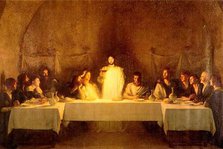In our last blog, we discussed what love is not. Now, we turn our attention to what love is, as well as where true love originates.
What Love Is
Here’s our proposed definition:
Love is the decision to reflect God’s goodness to others.
Everything good is a gift of God, so true love points people to God’s character and work. By God’s grace, we help people, we encourage them, we challenge them, and we connect them to His truth. Love appreciates the good God placed in others, and it seeks to add good, as well.
This love can take various forms in unique situations:
- The compassionate love parents have for their children
- The brotherly love among friends
- The intimacy and desire within marriage
We connect with many different people. And since what is good for one relationship may not be good for another, true love can look radically different in one place or the other. Some love demands tenderness and affection, while other love is best expressed at a distance—whatever makes relationships healthy and good.
Defining true love can be difficult—even our best attempts fall short. If we want to understand love in its purest sense, we must go a step beyond our own human definitions. We must look at the Person who created and embodies love.
God—The Origin of Love
From God flows all grace, goodness, and truth. To truly love people, therefore, we should connect them to the goodness of God. We should give them comfort, rest, and encouragement. We should help them understand God’s Word. We should help them seek God’s will for their lives.
This highest form of love makes no sense apart from God. This love is a decision that can only be made by those who abide in Christ—by those who represent His love to others.
This love lasts beyond physical attraction or other forms of bonding. Its foundation is not sin—nor is it even built on good things like fun, companionship, or desire. Rather, this love is built on God’s love for us.
God defines what is good, so God defines what is love. To love others, therefore, we must know God and rest in His love for us.
God—The Personification of Love
To say that “God is love” does not mean that love is a god. God is the epitome, the embodiment, of true love. All His attributes work in harmony with perfect love—even if we don’t always understand how.
God’s love permeates all His other attributes.
We will never understand love if we study only abstract concepts and terms. Thankfully, God gave us the perfect picture of love in Jesus Christ (1 John 4:9). God sent us His Son to show us His love. It is no wonder that we see God’s love shine through Christ’s compassion and miracles, through His patience and teaching, and even through the way He corrected falsehood and sin.
The Gospel of Love
The clearest act of love was also the clearest reflection of God’s character. Christ, the holy Son of God, fulfilled His own justice by taking the punishment we deserved. He gave Himself up to die on a cross, severing His relationship to the Father, becoming our very sin, our curse, the object of all justified hate, so that we could know God. At the same time, He showed His power, rising from the dead and establishing forever a spiritual kingdom of truth and hope.
Today, we have the privilege of obeying His new commandment—to love others with that same grace, truth, and hope.
Each of us can serve and help others. Love should animate that service so that God is glorified in everything we do (1 Pet. 4:8–11).
Related Resource
This post taken from Love & Truth: Navigating Relationships with God's Grace
More Posts








